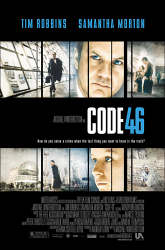 Director:
Michael Winterbottom
Starring:
Tim Robbins
Samantha Morton
Om Puri
Jeanne Balibar
Nabil Elouhabi
Release: 6 Aug. 04
IMDb
|
Code 46 
BY: DAVID PERRY
Although it occasionally hints at depth and wavers towards
avenues of intrigue, Code 46 becomes yet another inane quasi-futuristic
dystopian film. All these seem to exist in the same sphere, panging the
drums against our current trajectory by threatening the possibility of a
future in which most of the last is desert. Rarely are the Messages truly
communicable in films where half the dialogue is invented words for future
devices.
Here the key word is “papelle” for the tiny documents that allow people to
move from place to place in this decomposing urban future. Without it, a
person is forced to remain in their current city, atrophying; if they
attempt to leave, their lack of a return papelle will forever strand them in
the desert regions in between the cities. Additionally, there’s the idea of
Code 46, or the part of the future law that makes it illegal to procreate
with anyone hinting towards similar DNA -- likely a future problem due to
clones and royals. In this case, the Code 46 is called on papelle factory
worker Maria (Morton in a performance the film doesn’t deserve) and the
investigator, William (Robbins) trying to find out how papelles are being
smuggled out of the factory.
I hate these inane words, their inane uses, and the inane films that concoct
them. Directed by Michael Winterbottom and written by Frank Cottrell Boyce,
Code 46 comes as the type of retrogressive step too many filmmakers take.
Their last two films together, The Claim and 24 Hour Party People, were
amazing takes on genre filmmaking. I don’t doubt that this was in many ways
the draw for Winterbottom, that he might be able to fix the broken machine
that is this futuristic genre.
Furthermore, Code 46 doesn’t even quite make the cut within its own rights.
There have been good films to come from this idea, ranging from Blade Runner
to Gattaca. Though they often have myriad plots that waver towards the
incomprehensible, they also offer character development that makes the
lesser attempts (from Dune to Equilibrium) more noticeable. Even as the
amazing score by Steve Hilton and David Holmes (under the credit The Free
Association) gives weight to the events at hand, the story feels
immeasurably forced and unwieldy. Like the contrivances that must exist for
these plots to survive, Code 46 never fully rings true. The director and
writer might have meant well, but the final product makes less sense the
baby-cloning Euralians.
 |

